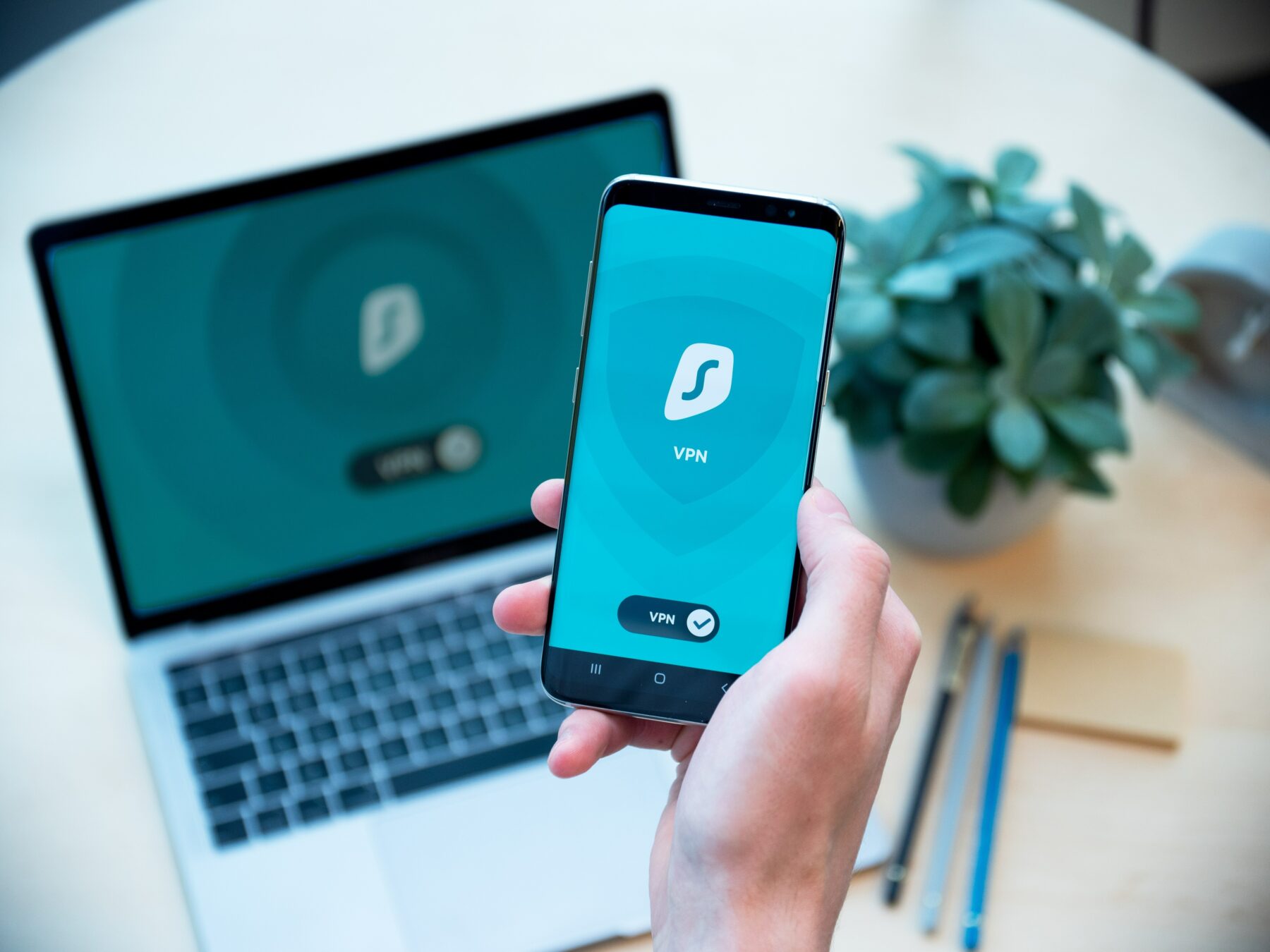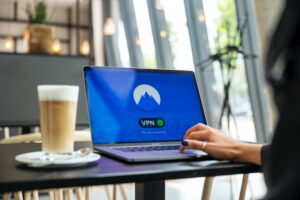The Ups and Downs of Public WiFi
Picture this: You’re at your go-to café, sipping on your favorite latte while scrolling through business emails on your laptop. The atmosphere is bustling, and the smell of freshly brewed coffee fills the air. But suddenly, your heart sinks as you find yourself locked out of your account. You try every trick in the book, even the standard “turn it off and on again” tactic, but nothing seems to work. Public WiFi has undoubtedly made remote working more accessible than ever before, but it also brings risks that can disrupt our digital lives.
A recent survey found that 56% of people don’t use a VPN while connected to public Wi-Fi, and 41% don’t use a VPN at all. The risks of using public wifi unprotected are real, from getting locked out of accounts to having our data scrubbed and sold or even falling victim to bank account information theft. In this blog post, we’ll dive into essential cybersecurity practices that can help protect you and your company’s digital footprint when using public wifi networks. We aim to provide helpful solutions, ensuring you can work confidently and securely from anywhere, coffee in hand. So, let’s tackle this challenge together and equip you with the knowledge to safeguard your digital presence.
What Security Risk Does Public WiFi Pose?
Public WiFi networks have become an enormous part of our lives in our increasingly interconnected world. They offer convenience, allowing us to work, connect, and stay productive while on the go. However, it’s crucial to recognize that these networks, despite their benefits, can pose significant risks to our digital security.
Malicious actors often lurk on public WiFi networks, taking advantage of the unsecured nature of these connections to employ a range of techniques to gather sensitive data from unsuspecting users. These cybercriminals may utilize packet sniffing, a method where they intercept and analyze data packets transmitted between devices, to capture usernames, passwords, and other confidential information. Another technique they employ is setting up fake WiFi networks, known as “evil twins,” which mimic legitimate networks to trick users into connecting to them. Once connected, these attackers can gain unauthorized access to your device and exploit any vulnerabilities they find.
Using public wifi without any security measures is like leaving your front door open for anyone to walk in and help themselves with your personal information. Imagine the consequences of being locked out of your accounts, losing valuable data, or worse, having your bank account information fall into the wrong hands. It’s a chilling thought that reminds us of the importance of protecting our digital footprints. This goes to show that implementing robust cybersecurity measures is no longer an option; it’s a necessity. Whether you’re working on personal devices or managing a fleet of company equipment, safeguarding sensitive information should be a top priority. It’s not just about protecting your own data; it’s about safeguarding your company’s intellectual property, client information, and reputation.
By taking proactive steps to fortify your digital defenses, such as using anti-malware software and a reliable VPN, you can minimize the risk of falling victim to cyber threats while using public WiFi networks. Knowledge is power, and by equipping yourself with the right information and solutions, you can work confidently, knowing you’re actively mitigating potential risks. So, let’s dive in and discover how you can protect your digital footprint in the world of public WiFi networks.

Recommended Measures for Public WiFi Security
Anti-Malware Software:
One of the fundamental pillars of protecting your digital footprint is having robust anti-malware software in place. Malware, a term derived from “malicious software,” is a broad category encompassing various harmful programs designed to wreak havoc on your devices and compromise your data. It can take the form of viruses, ransomware, spyware, or adware, each with its detrimental effects.
When selecting anti-malware software for your personal or company devices, there are several factors to consider.
- Compatibility: Ensure that the software you choose works seamlessly with the other programs and systems your organization relies upon. After all, installing the best anti-malware program won’t matter if it conflicts with essential software and renders them ineffective.
- Silence: Another important consideration is how the anti-malware software operates in the background. An ideal solution should be silent and invisible, working diligently without disrupting your workflow or bombarding you with intrusive pop-ups. Nobody wants to be constantly bothered by notifications, and a sluggish computer can slow productivity. Look for software that efficiently catches and neutralizes threats before they become significant problems.
- Quality of Protection: Opting for a solution that defends against known malicious actors and offers protection against emerging threats like zero-day attacks is essential. These attacks exploit vulnerabilities that have yet to be discovered or patched, making them particularly dangerous.
Our go-to at Edge Networks is CrowdStrike, a reliable anti-malware software that prevents harmful actors and proactively detects zero-day attacks. By deploying a trusted solution like CrowdStrike, you can significantly reduce the risks of falling victim to malware and other cyber threats.
Virtual Private Network (VPN):
While anti-malware software protects against malicious software, a Virtual Private Network (VPN) offers additional protection for your online activities. A VPN creates a secure and encrypted connection between your device and the internet, making it extremely difficult for hackers and other malicious actors to intercept and exploit your data.
When you connect to the internet through a VPN, your IP address is hidden and replaced by the IP address of the VPN server. This ensures that your online activity remains anonymous and your data remains secure. Whether you’re browsing the web, accessing company resources, or sending sensitive information, a VPN protects your digital footprint from malicious actors.
When choosing a VPN, several key considerations come into play.
- Speed: Using a VPN can sometimes result in a slight reduction in internet speed. Look for VPN providers that offer optimized servers and protocols, allowing you to enjoy seamless browsing and efficient data transfer without sacrificing performance.
- Security: Prioritize security features such as AES-256 encryption and OpenVPN functionality, as they provide strong protection for your data. You may also want to look into VPNs that have an open-source feature and accept anonymous payments.
- Compatibility: Ensure that the VPN you choose is compatible with the programs, websites, and systems you use frequently. This compatibility will ensure a smooth and uninterrupted user experience.
For companies without a physical router for their VPN, we recommend NordLayer as an excellent option. With NordLayer, you won’t experience any noticeable change in internet speed, and its compatibility with various programs and sites allows for seamless integration into your workflow. Additionally, NordLayer offers advanced security features and accepts anonymous payments, providing peace of mind while protecting your digital activities.
Implementing anti-malware software and a VPN establishes a powerful defense against cyber threats when using public wifi networks. These security measures work together to protect your devices, data, and digital identity, ensuring that you can work remotely with confidence and peace of mind.
Remember, the world of cybersecurity is constantly evolving, and it’s crucial to stay updated and informed about the latest threats and best practices. Implementing these recommended security measures is a significant step in safeguarding your digital footprint, but it’s also essential to remain vigilant and proactive in adapting to new challenges. Protecting your data is a collective effort, and by utilizing reliable solutions like CrowdStrike and NordLayer, you take a significant stride toward a more secure digital future.
Browse Confidently and Securely on Public WiFi
Implementing effective cybersecurity practices and protecting your digital footprint may sound daunting, but we assure you that it doesn’t have to be overwhelming. At Edge, we understand the challenges individuals and organizations face in navigating the complex world of cybersecurity. We believe that everyone should have access to reliable cybersecurity solutions and the knowledge to utilize them effectively.
Our mission is to help you reach your security goals while providing clarity and support every step of the way. With our guidance, you can confidently navigate the intricacies of anti-malware software, VPNs, and other essential security measures to safeguard your digital presence. By implementing these recommended practices, you can enjoy the convenience of public Wi-Fi without compromising your privacy and security. Please don’t hesitate to contact us and let us assist you in achieving peace of mind.


